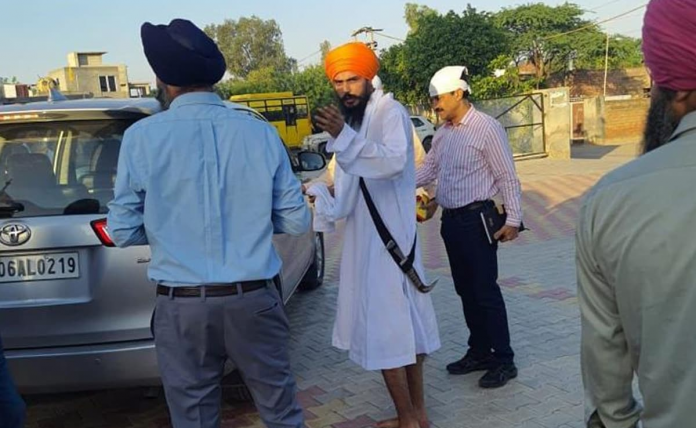OTTAWA, CANADA – India’s quest to detain Bhai Amritpal Singh has once again exposed the injustice and hypocrisy of the Government of India towards Sikhs.![]()
Today, Bhai Amritpal Singh presented himself for arrest at village Rode in Punjab at the same place he assumed leadership of the Waris Punjab De (WPD) organization and at the birthplace of Sant Jarnail Singh Bhindranwale. Amritpal Singh paid his respects at Gurdwara Sant Khalsa and briefly addressed the Sangat following which he turned himself over to the police.
Bhai Amritpal Singh has been detained under the National Security Act (NSA) and transported to the Dibrugarh Jail in Assam where nine of his companions are also currently being detained. The NSA is a colonial law that allows Indian authorities to indefinitely detain individuals without charges and transport them to any state in India for imprisonment.
Indian security forces had unsuccessfully attempted to capture Amritpal Singh since March 18 in a state-wide crackdown which saw internet blackouts, mass detentions of Sikh activists, censorship and intimidation of journalists and harassment of the families of members of the WPD organization.
The Government of India has been unable to justify the magnitude or explain the need for its crackdown on Sikhs. Until March 18, Bhai Amritpal Singh was not accused of any serious crime. The crackdown appeared to target the growing popularity of Bhai Amritpal Singh’s Khalsa Vahir movement which was inspiring Punjab’s youth to give up drugs and return to Sikhi.
WSO President Tejinder Singh Sidhu said today, “The crackdown on Sikhs in Punjab has once again exposed the injustice towards Sikhs in India and the hypocrisy of the Indian government. It is still not clear what Bhai Amritpal Singh has been accused of which would justify such a massive and ongoing security operation.
While other states in India are seeing a frightening rise in Hindutva extremism, attacks on minorities and rampant crime and violence, there has been no government reaction. By comparison, there is nothing that could have justified the massive state repression that has taken place in Punjab. There are clear double standards and hypocrisy in India when it comes to Sikhs and other minorities.
If India holds itself out as a democracy, then it must respect basic democratic rights and values. Bhai Amritpal Singh was outspoken in his criticism of the treatment of Sikhs in India and in his support for Khalistan. His advocacy was squarely within expression that is permitted in any democracy and there is nothing to suggest that he was in violation of any laws.
| “Indian security forces had unsuccessfully attempted to capture Amritpal Singh since March 18 in a state-wide crackdown which saw internet blackouts, mass detentions of Sikh activists, censorship and intimidation of journalists and harassment of the families of members of the WPD organization.” |
The past month has been a reminder to Sikhs that their democratic rights and freedoms are not secure in India and can be violated at any time. The community must come together to ensure that those activists who have been detained are freed and allowed to come back to their families.
We expect Canada and other G20 countries to hold India accountable and demand that the Modi government respect basic democratic and human rights.”
Background Information
Ajnala Police Station Incident : One of the reasons provided to justify the crackdown on Bhai Amritpal Singh is an incident at the Ajnala police station which took place on February 24, 2023. In response to police aggression, Sikh protestors pushed through police barricades and several protestors and six police officers were injured.
This justification however fails to stand up as protests in India regularly result in more police injuries but have never resulted in anything similar to the current crackdown.
Some recent examples from just this year:
Jan 13, 2023: Buxar, Bihar Farmer Protest: 11 police officers injured
Jan 22, 2023: Kolkota Indian Secular Front protest, 19 police officers injured
Feb 3, 2023: Jallikattu protest in Tamil Nadu: 15 police officers injured
Feb 10, 2023: Dehradun student protest: 15 police officers injured
March 1, 2023 Odisha BJP Yuva Morcha (youth campaign): 21 police officers injured
Indian Security Forces in Punjab
Security forces have flooded into Punjab. In addition to road blocks and checking across Punjab, flag marches have been regularly taken out by police and military in cities across Punjab, including around Sikh shrines like Sri Darbar Sahib Amritsar, Anandpur Sahib and Damdama Sahib. Section 144 of the Indian Penal Code has been invoked, restricting gatherings of four or more people.
The celebration of Vaisakhi was specifically targeted by security forces who put up multiple checkpoints and searches around major gurdwaras and Takhats, resulting in significantly less attendance.
Internet Blackout & Censorship
Mobile internet and SMS services remained blacked out in Punjab for five days. In addition, Sikh social media accounts of organizations, politicians and journalists have been blocked in India, including the WSO’s. Other blocked accounts include – NDP leader Jagmeet Singh, poet Rupi Kaur and several news outlets. In an organized campaign, Sikh accounts and posts criticizing the crackdown have been targeted by Indian IT cells and bots.
Many Sikhs have been detained or harassed by police for social media posts critical of the government.
Systematic Disinformation Campaign
India’s media outlets (often referred to as the “Godi” media or government’s lap media) have systematically been creating an anti-Sikh narrative using lies and fabricated stories. Patently false stories have been published by major media outlets in an organized campaign to vilify Sikhs. Specifically, Bhai Amritpal Singh has been the subject of baseless accusations. A similar approach was used in the lead-up to the 1984 Sikh Genocide to justify the massacre of Sikhs.
Harassment and Detention of Sikhs
According to Indian authorities, close to 400 Sikhs have been taken into custody. 9 Sikh activists have been detained under the National Security Act and transported to Dibrugarh Jail in Assam, over 2500 kilometres from Punjab. The Dibrugarh Jail is considered one of India’s harshest prisoners and the Sikh detainees have limited or no access to family or the larger Sikh community. Transportation of political prisoners to far-off prisons is a practice that was introduced to India during the British Colonial period.
According to unofficial reports, many hundreds more Sikhs have been summoned to police stations, questioned and threatened, including those who simply received amrit during the Khalsa Vahir. Many of those who have been detained have reported being tortured in custody.
Several reporters and lawyers have been detained and questioned by Indian authorities in order to intimidate them to support the government narrative and not criticize government actions.
Family members of Sikh activists have also been illegally detained and harassed. Relatives of UK-based Sikh activist Avtar Singh Khanda, including his mother and sister were abducted by police and interrogated for hours.
Bhai Amritpal Singh’s wife, Kirandeep Kaur was prevented from returning to the UK and was also questioned for hours at Amritsar airport. Despite being a UK citizen, Kirandeep Kaur has been told she will not be permitted to return to the UK or travel. Detaining and harassing relatives of Sikh activists was a tool commonly used by Indian security forces in the 80s and 90s that has now resumed in full effect.
The World Sikh Organization of Canada (WSO) is a non-profit organization with a mandate to promote and protect the interests of Canadian Sikhs, as well as to promote and advocate for the protection of human rights of all individuals.


